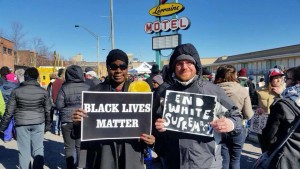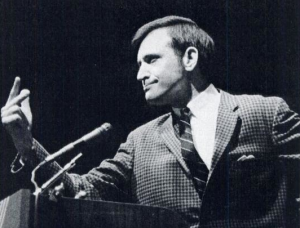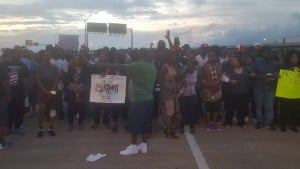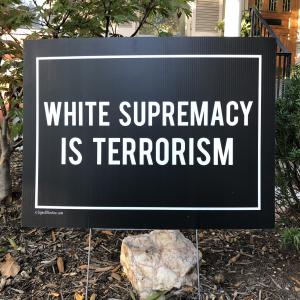“Do you really believe white racism exists?”
A BLM activist asked me that question as we ended our march at the site of Dr. King’s martyrdom.
After an awkward pause, I responded with something like this: “If you’re asking if I think many white people are racist, yes.” (Surely she had understood “white racism” as racism enacted against whites.)
Her friend asked to see my sign again. I showed it to her. The sign said, “End white supremacy.”
She smiled and exclaimed, “Oh, we thought it said, ‘End white racism.’” Then she wanted to take a picture of her friend and me.
I posted it as my Facebook cover pic. It got mixed responses, mostly from white friends. All the negative comments and some of the positive ones responded not to my sign (“End white supremacy”) but to the other sign in the picture (“Black lives matter”).
That was in January. This week I shared on Facebook a link to an article about white fragility. The responses were similar. Some of the commentators seemed to accept the reality of white fragility. Objectors unanimously redirected the conversation instead of dealing with the issue at hand.
Why are we whites more likely to argue about which actions are appropriate and whether racism exists? Why are we less likely to admit white supremacy as the cause of racial inequality? At least part of the answer is white fragility, which often hides behind language of color-blindness.
Last week’s events shed painful light on claims of color-blindness. Those events challenge the assumption that black citizens’ oppression is due to their own failures. Those events show that racial inequalities are currently real and undeniable.
And at least some national news sources’ public discussions expose an ignorance (or an ignoring) of centuries of history. In this historical context of continual racial oppression enacted by the legally powerful, is the recent violence any surprise?
When racial strife ends life, the cause is more than any single incident. The cause is deeply rooted in our history, deeply rooted in our humanity.
Our history prevents surprise but should not prevent tears and must not escape the attention of our culture’s leaders, including those in religious communities.
 Recently I presented a conference paper about radio sermons against racism in the summer of 1968. John Allen Chalk, a white preacher, addressed a predominately white audience in the aftermath of the Lorraine Motel tragedy.
Recently I presented a conference paper about radio sermons against racism in the summer of 1968. John Allen Chalk, a white preacher, addressed a predominately white audience in the aftermath of the Lorraine Motel tragedy.
According to Chalk, white racism says that “the Negro belongs to a distinct race,” that “the Negro race has no common ancestry with other human beings.”
White racism says that “the black [person] is a distinct biological species that falls somewhere between white [people] and apes” and that “all white [people] in America are part of one common racial group” that is “superior.”
And white racism says that “regardless of personal ability and achievement, every Negro is more similar to all other Negroes than to a person of comparable skills and intelligence who happens to be a member of the white race.”
Chalk preached that “racism threatens the very heart of Christianity, strikes at the root of all Biblical truth, and directly violates Christian faith.”
He said, “Tenets of racism… conflict with the teachings of the God of the Bible.”
Chalk added that racism counters the biblical view of the church as including “all kinds of [people]… all nations.”
He played on the Great Commission: “Racism would modify Christ’s words to mean, ‘Go ye therefore and teach your own kind,’ or even worse, ‘Go ye therefore and teach all nations, making sure to keep them in their place.’”
He continued, “Racism’s future depends on my attitudes and yours. Will you oppose racism in a loving, courageous manner?”
Apparently assuming the answer to that question was not certain, he proclaimed, “One thing is certain: A day of judgment has dawned on America as a nation.”
He said, “Traditional Christianity has failed to answer the challenge of racism…. Where racism flourishes Christianity dies. And where Christ rules the hearts and lives of [people] racism is destroyed.”
Recent events continue trauma that is centuries old, and I pray that more religious leaders will follow John Allen Chalk’s example. They might receive hate mail as he did, but that’s nothing compared to the deaths that continuously plague our culture.
Religious speech isn’t all that’s needed. Laws and policing practices and more need to change. But religious leaders must stand against injustice and speak for peace and love. Preachers need to play their parts in equipping religious communities to live as peoples of justice and mercy.
Whatever the risks, we must keep the faith. We must proclaim the truth.
We white preachers must admit white supremacy and work to end it.
Steven Tramel Gaines ministers with Cordova Community Church in Memphis, TN. As the first Michael and Suzanne Osborn Fellow for the Study of Rhetoric and Public Address at the University of Memphis, he teaches communication courses and is a PhD student researching rhetoric, race, religion, and gender. He is a graduate of Abilene Christian University and Harding School of Theology. You may follow him on Twitter (@steventgaines) and go to his ministry website to contribute to his work.
Donate to the Work of R3
Like the work we do at Rhetoric Race and Religion? Please consider helping us continue to do this work. All donations are tax-deductible through Gifts of Life Ministries/G’Life Outreach, a 501(c)(3) tax exempt organization, and our fiscal sponsor. Any donation helps. Just click here to support our work.














